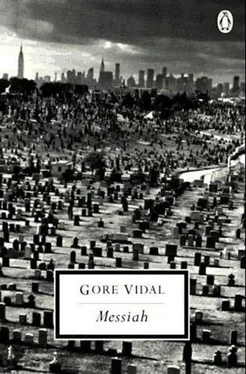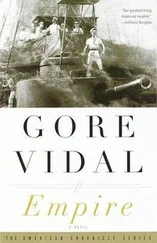Gore Vidal - Messiah
Здесь есть возможность читать онлайн «Gore Vidal - Messiah» весь текст электронной книги совершенно бесплатно (целиком полную версию без сокращений). В некоторых случаях можно слушать аудио, скачать через торрент в формате fb2 и присутствует краткое содержание. Жанр: Современная проза, на английском языке. Описание произведения, (предисловие) а так же отзывы посетителей доступны на портале библиотеки ЛибКат.
- Название:Messiah
- Автор:
- Жанр:
- Год:неизвестен
- ISBN:нет данных
- Рейтинг книги:3 / 5. Голосов: 1
-
Избранное:Добавить в избранное
- Отзывы:
-
Ваша оценка:
- 60
- 1
- 2
- 3
- 4
- 5
Messiah: краткое содержание, описание и аннотация
Предлагаем к чтению аннотацию, описание, краткое содержание или предисловие (зависит от того, что написал сам автор книги «Messiah»). Если вы не нашли необходимую информацию о книге — напишите в комментариях, мы постараемся отыскать её.
Messiah — читать онлайн бесплатно полную книгу (весь текст) целиком
Ниже представлен текст книги, разбитый по страницам. Система сохранения места последней прочитанной страницы, позволяет с удобством читать онлайн бесплатно книгу «Messiah», без необходимости каждый раз заново искать на чём Вы остановились. Поставьте закладку, и сможете в любой момент перейти на страницу, на которой закончили чтение.
Интервал:
Закладка:
"Really? I must confess I…"
"Thought we were having an affair? Well, it's not true."
The rigidity left her as suddenly as it had possessed her. She grew visibly passive, even helpless, in the worn upholstered chair, her eyes on me, the anger gone and only weakness left. "What can I do?" It was a cry from the heart… all the more touching because, obviously, she had not intended to tell me this. She'd turned to me because there was no one else to whom she could talk.
"You… love him?" That word which whenever I spoke it in those days always stuck in my throat like a diminutive sob.
"More, more," she said distractedly. "But I can't do anything or be anything. He's complete. He doesn't need anyone. He doesn't want me except as… a companion, and advisor like you or Paul… it's all the same to him."
"I don't see that it's hopeless."
"Hopeless!" The word shot from her like a desperate deed. She buried her face in her hands but she did not weep. I sat awkwardly, inadequately watching her. The noise of a clock alone separated us: its dry ticking kept the silence from falling in about our heads.
Finally, she dropped her hands and turned toward me with her usual grace. "You musn't take me too seriously," she said. "Or I mustn't take myself too seriously which is more to the point. Cave doesn't really need me or anyone and we… I, perhaps you, certainly others, need him. It's best no one try to claim him all as a woman would do, as I might, given the chance." She rose. "It's late and you must be tired. Don't ever mention to anyone what I've told you tonight… especially to John. If he knew the way I felt…" She left it at that. I gave my promise and we went to our rooms.
I stayed two days at the farm, listening to Cave who continually referred to the accident: he was almost petulant, as though the whole business were an irrelevant, gratuitous trick played on him by a malicious old man.
His days were spent reading his mail (there was quite a bit of it even then), composing answers which Iris typed out for him, and walking in the wooded hills which surrounded the farm on two sides.
The weather was sharp and bright and the wind, when it blew, tasted of ice from the glaciers in the vivid mountains: winter was nearly with us and red leaves decorated the wind, so many ribbons for so much summer color. Only the firs remained unchanged, warm and dark in the bright chill days. Cave and I would walk together while Iris remained indoors, working. He was a good walker, calm, unhurried, sure-footed, and he knew all the trails beneath the yellow and red leaves fallen.
Cave agreed with me on most of my ideas concerning the introduction; and I promised to send him my first draft as soon as I'd got it done. He was genuinely indifferent to the philosophic aspect of what he preached. He acted almost as if he did not want to hear of those others who had approached the great matter in a similar way. When I talked to him of the fourth-century Donatists who detested life and loved heaven so much that they would request strangers to kill them, magistrates to execute them for no crime, he stopped me: "I don't want to hear all that. That's finished. All that's over. We want new things now."
Iris, too, seemed uninterested in any formalizing of Cave's thought though she saw its necessity and wished me well, suggesting that I not ever intimate derivation since, in fact, there had been none: what he was, he had become on his own, uninstructed.
During our walks, I got to know Cave as well as I was ever to know him. He was indifferent, I think, to everyone. He gave one his private time in precise ratio to one's belief in him and importance to his work. With groups, with the masses, he was another creature: warm, intoxicating, human, yet transcendent… a part of each human being who beheld him at such times, the longed-for complement to the common soul. Yet though I found him, as a human being, without much warmth or intellectual interest I nevertheless identified him with the release I'd known in his presence and, for this new certainty of life's value and of death's irrelevance, I loved him. On the third day I made up my mind to go back East and do the necessary writing in New York, away from Paul's hectic influence and Cave's advice. Cave asked me to stay with him for the rest of the week but I could see that Iris regarded me now as a potential danger, a keeper of secrets who might, despite promises, prove to be disloyal; and so, to set her mind at ease as well as to suit my own new plans, I told her after lunch on the third day, when we were for a moment alone in the study, that I had said nothing to Cave, that I was ready to go back that evening if she would drive me to Spokane.
"You're a good friend," she said. "I made a fool of myself the other night. I wish you'd forget it… forget everything I said."
"I'll never mention it. Now, the problem is how I can leave here gracefully. Cave just asked me this morning to stay on and…"
But I was given a perfect means of escape. Cave came running into the room, his eyes shining. "Paul! I've just talked to Paul in L.A. It's all over! No heirs, nothing, no lawsuit. No damages to pay."
"What's happened?" Iris stopped him in his excitement.
"The old man's dead!"
"Oh Lord!" Iris went gray. "That means a manslaughter charge!"
"No, no… not because of the accident. He was in another accident. A truck hit him the day after he left the hospital. Yesterday. He was killed instantly… lucky devil: and of course we're in luck too."
"Did they find who hit him?" I asked, suddenly suspicious. Iris looked at me fiercely. She had got it too.
"No. Paul said it was a hit-and-run. He said this time the police didn't find who did it. Paul said his analyst calls it 'a will to disaster'… he wanted to be run over. Of course that's hardly a disaster but the analyst thinks the old way."
I left that afternoon for New York, leaving Cave jubilantly making plans for the New Year: everything was again possible. Neither Iris nor I mentioned what we both knew… each of us, in our different way, accommodating the first of many crimes, as we drove across the smoky hills to Spokane.
Six
1
"The tone, dear Gene, has all the unction, all the earnest turgidity of a theologian. You are perfect." Clarissa beamed at me wickedly over lunch in the Plaza Hotel. We sat at a table beside a great plate-glass window through which we could see the frosted bleak expanse of Central Park, dingy in city snow, ringed by buildings like so many mountain peaks, monotonous in their sharp symmetry. The sky was sullen, gray with more snow to fall. The year was nearly over.
"I thought it really quite to the point," I said loftily but with an anxious look at the thin black volume between us which was that day to be published. The hasty work of one hectic month released in record time by a connection of Paul Himmell's.
"It's pure nonsense, your historical part. I know, though I confess I was never one for the philosophers in those days… dreary egotistical men, worse than the actors and not half so lovely. Waiter, I will have a melon: out of season I hope. I suggest you have it too. It's light."
I ordered pot-de-crême , the heaviest dessert on the menu.
"I've made you angry," Clarissa pretended contrition. "I was only trying to compliment you. What I meant was that the sort of thing you're doing I think is nonsense only because action is what counts, action on any level… not theorizing."
"There's a certain action to thinking , you know, even to writing about the thoughts of others."
"Oh, darling, don't sound so stuffy. Your dessert, by the way, poisons the liver. Oh, isn't that Bishop Winston over there by the door, in tweed? In mufti, eh, Bishop?"
Читать дальшеИнтервал:
Закладка:
Похожие книги на «Messiah»
Представляем Вашему вниманию похожие книги на «Messiah» списком для выбора. Мы отобрали схожую по названию и смыслу литературу в надежде предоставить читателям больше вариантов отыскать новые, интересные, ещё непрочитанные произведения.
Обсуждение, отзывы о книге «Messiah» и просто собственные мнения читателей. Оставьте ваши комментарии, напишите, что Вы думаете о произведении, его смысле или главных героях. Укажите что конкретно понравилось, а что нет, и почему Вы так считаете.












